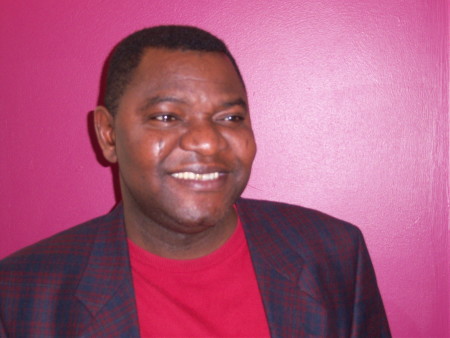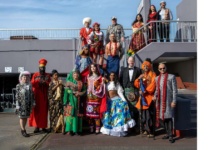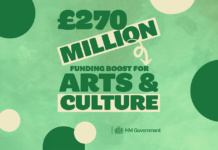IROKO, a ‘traditional African theatre company’ based in the heart of London’s east end, has been putting on shows and workshops for nearly two decades.
The spirit of Africa and its rich artistic heritage lies at the heart of this company, which aims to use African culture in all its forms (theatre, storytelling and physical art) to help better the wider community and those in it, no matter their backgrounds.
We sat down with IROKO’s Creative Director, Alex Oma-Pius, to find out more.
Tell us a bit about IROKO Theatre (how it started, what you do, who your audience is and the journey so far.)
IROKO Theatre Company has been around now for some nineteen years. The company uses the arts and in particular but I might add, not exclusively African theatre arts, i.e. storytelling, drama, music, dance, arts and crafts as a vehicle to advance the education, health and wellbeing of people of all backgrounds, age groups and abilities and particularly, the disadvantaged.
Our overall aim is always to give participants the opportunity to achieve their full potential, play an active role in their community and have an improved quality of life. This we achieve not only through performances and workshops but also through providing resources, holding exhibitions or training sessions for young people, i.e. those not in education, employment or training (NEET). We also train teachers to equip them with skills, confidence and self-esteem to deliver their work more effectively.
I think I can sum up the journey so far both for myself and IROKO as one of a ‘voyage of discovery’! We had no idea when we started out that what I now realise was a relatively narrow goal of working in schools with children and young people, would blossom into an organisation that now works in such a diverse range of fields, such as education, community health and wellbeing, to our present very stimulating interest, which is heritage research and archiving. No doubt we will diversify further in the future as new opportunities reveal themselves, as we always aim to respond to identified needs of our service users. However, we will always remember our roots – that we are here to promote and share African culture and that in doing that, the lives of those who take part in our work will be greatly enriched.
IROKO Theatre is quite an interesting name, what does it mean and where does it stem from?
The name IROKO was chosen after the Iroko tree, which flourishes in West Africa. It is large and imposing and its roots go deep. It is also considered sacred; a tree with special powers and meaning. As the saying goes, ‘a tree that never dies’!
It seemed apt to take this name as a way of symbolising the strength and depth of African culture and our overall quest to promote and share it far and wide, both to people from other cultures and of course to Africans, some of whom are regrettably, for one reason or another, disconnected from their culture and heritage.
What does your role as artistic director involve and what kind of projects have you worked on. What’s the best part about being IROKO’s artistic director and what challenges have you and the company had to overcome?
The best part of being Artistic Director is that I get to conceive, develop and work on a variety of projects – often very different in nature indeed, but always interesting and stimulating. For instance, one of our most successful projects to date that I designed has been our ‘Family Edutainment’ project, funded by Big Lottery. The four year inter-generational project in collaboration with Barking & Dagenham Libraries and Redbridge Libraries, used storytelling, arts and craft as a vehicle for enhancing family learning in a fun and informal environment. The project was so successful that Big Lottery offered IROKO additional one year funding for impact and sustainability and this enabled us to produce new business module, which we are now implementing.
We have also carried out projects for older people, one of which was the ‘Forgotten Folks’ project funded by The Evening Standard, where we used group music-making and gentle movement to deal with isolation and loneliness often experienced by the elderly.
We are particularly proud of the various heritage projects that we have held over the last few years, courtesy of Heritage Lottery Fund. For instance, we have researched subjects as diverse as the African community that has been present in the Canning Town area in East London since the 1920s; African rituals and traditions and how they have been preserved and/or adapted by Africans to suit living in London.
In fact, we are currently engrossed in a really fascinating project, ‘Our Shared Heritage’, which is investigating and identifying stories, objects, tricksters, gods and goddesses from different cultures, particularly Aztec, Islamic, European and Asian and their African counterparts. We are collaborating with The British Museum on the project and training to enhance the skills of 45 participants from the education and cultural sector is being held at the museum as part of the project.
The research to-date is throwing up some really interesting similarities. For instance, do you know that coral beads have been used for centuries in various parts of the world and in many cultures have become symbols of wealth and prosperity? Coral was highly prized amongst the Ancient Greeks and Romans as it was believed to have spiritual and medicinal properties.
During a smallpox outbreak in 1850’s London, coral charms were made to protect people from contracting the disease! Another of our findings is that Thunder Gods in various cultures are depicted with a physical embodiment of their power – Shango, his double-headed axe, Thor, his hammer, Zeus, a thunderbolt, etc. Lei Gong holds a thunderbolt or a drum or axe or mallet. These are interesting facts and we hope to use our research findings to produce a choreopoem and an exhibition that will be taken into libraries and schools in East London later in the year. In fact, I urge your readers to follow us on Facebook, Twitter, etc. and of course our website over the coming months to read all about our progress on this fascinating project.
In terms of the challenges that the company has had to overcome, I am sure these are not so very different from those faced by other arts organisations both big and small, especially in today’s very difficult economic climate. Lack of steady income and funding is always a worry. It means, of course, that you cannot sometimes evolve as a company in the way you might wish. I have already said that IROKO has diversified significantly over the years and I have no doubt that this has been the key fact in helping us survive to-date. I just hope that we can continue to do so in the years ahead.
What do you hope to achieve as a company – your goals for the near future?
Our goals for the near future are firstly, to consolidate and build on the successes that we have had through taking on bigger and interesting projects that respond to our clients’ immediate needs. Secondly, IROKO is already a driving force and game-changer in the field of theatre-in-education and we would like to develop this further by attracting core funding from different bodies, e.g. trusts, the private sector and/or individuals to take the company to new and exciting sustainable heights. We are particularly keen on developing our training programme, as we are a National Open College Network accredited centre. Our certificated programme can help enhance young people’s educational, volunteering and or job prospects. So, if there is anybody out there wishing to contribute to the development of African arts and culture in the diaspora, please get in touch with us!
Have you received any accolades for your work?
Yes, IROKO’s contribution to the cultural life of the United Kingdom has been recognised by various bodies. IROKO has been shortlisted for the Queen’s Jubilee Award and received recognition from The Guardian Newspapers for our “innovative approach to education”. We also received the NatWest Award for “Community Involvement” and [were] made a “Community of Health” organisation by The Forum for Health and Wellbeing on behalf of the NHS. Most recently, we received the “Community Impact Award” for our contributions towards the development of communities and, after weeks of thorough assessment processes, are recognised as a National Open College Network accredited Centre. This means that we can run training programmes and awards students with an accredited certificate in ‘IROKO Theatre of The Everyday [a masterclass that explores African theatre]
On a personal level, I have received a certificate from the Mayor of London, “for making an outstanding contribution to the cultural life of Londoners”. I have been made a ‘local hero’ by The London Borough of Newham for my “contribution to Arts & Heritage within the borough”; I have twice been the winner of the Afro Nollywood award for my ‘outstanding contribution to African arts and culture in the diaspora’ and have most recently won the GAB Award for ‘outstanding contribution to the promotion of the positive image of Africa and Africans around the world through Cultural Heritage’. I am also a Fellow of The Royal Society of Arts.










5-Star Review of IROKO Theatre’s The Green Stone Bead at Goldsmith’s Uni
https://www.londontheatre1.com/news/108578/iroko-theatres-the-green-stone-bead-at-goldsmiths-uni/
Comments are closed.